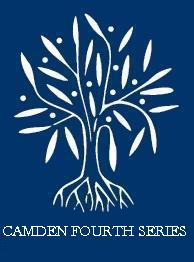No CrossRef data available.
Article contents
I. Sir William Wentworth's Volume
Published online by Cambridge University Press: 21 December 2009
Extract
1. Sir William Wentworth's advice to his son (SC, x1/1, fo. 1r) Anno domini 1604 & 2 of Kinge James.
William Wentworth of Wentworth Woodhus esquyer (Baptized 3 of July 4 of Elizabeth 1562) being neare the age of 45 yeares his advice and councell to Thomas Wentworth his sonne and heire (Baptized 13 April 34 of Elizabeth 1592. 22 yeares old 1604) touching the managing of his priuate estate and affaires; all written with his owne hande.
- Type
- Research Article
- Information
- Copyright
- Copyright © Royal Historical Society 1973
References
page 9 note 1 In the margin, probably in the hand of Sir George RadcliSe.
page 9 note 2 ‘all yow think’ has been struck through.
page 10 note 1 [Margin] wilfull murther.
page 11 note 1 [Margin] som use in a great matter for fauor to offer to lend C11 or Cmk etc upon bond because they would not offer itt as a gifte though they look not for repaiment.
page 11 note 2 [Margin] when the plague was at Yorke.
page 11 note 3 [Margin] In no case be confident in your case, because it is good, but fear the worst.
page 11 note 4 [Margin] if a great man fale his riche favorits are in great danger.
page 12 note 1 [Margin]Good to take coppyes of anie thing of importance that maie after be called in question.
page 13 note 1 [Margin] q[uery] for the worth of the office if yow sell itt and for good suertys &c.
page 15 note 1 [Margin] Take hede what yow speake befor them, if yow be wyse, especially tuching anie great person. If ii of your seruants will marrie withoutt consent of frends and providence how to liue, parte them. Not good to kepe those that will marie longe, for they wilbe confederate &c.
page 16 note 1 [Margin] So haue yow him in feare and at commandment.
page 16 note 2 [Margin] Entayle of Gascoigne of Record in Chancery.
page 17 note 1 [Margin] A nage, a sattin dublett, before and betyme.
page 18 note 1 [Margin] Your frend to daie your enemy to morowe.
page 19 note 1 [Margin] towards the end of theyre yeares.
page 19 note 2 [Margin] CAVEAT EMPTOR.
page 19 note 3 [Margin] I could neuer fynde man so honest herin but he would speake cunninglie to gaine in the bargaine.
page 20 note 1 [Margin] Maryinge a superior bringes euer charg and often danger.
page 20 note 2 [Margin] We see daily old wydowes fonder then yong both for choice of husbandes, servants and frends.
page 22 note 1 [Margin] Loue, anger and ambition, the 3 most pourefull passions.
page 22 note 2 [Margin] In anie case write not till your anger be quyte gone, vizt. not befor one night be passed.
page 23 note 1 [Margin] a secrete discrete frend better then anie servantt, unles some one long proued servant whose house and lyving is under yow and lyke so to remaine.
page 30 note 1 The Redmaynes were a family with Cumberland origins who intermarried with the Gascoignes, so that Whitaker assumed that their half of the manor of Harwood had passed to the Gascoignes by inheritance. James Ryther was denounced by Archbishop Sandys as a church papist who protected Catholics and depended on Sir Thomas Fairfax. He died 4 September 1596. Cliffe, J. T., The Yorkshire Gentry (London, 1969), p. 241Google Scholar; Whitaker, T. D., Loides and Elmete (Leeds, 1816), pp. 166–67.Google Scholar
page 32 note 1 This was in 1595, Hunter, ii, p. 213. Hunter quotes from an account by Gargrave's daughter Prudence, who denied that Gardiner was poisoned, but he does not mention Huntingdon's enmity.
page 33 note 1 [Margin] suspected to be poisoned.
page 35 note 1 Wentworth on 16 February 1616 petitioned in Chancery stating that Sir William had paid £11,000 for Harewood and claiming that Robert Mawde's father had wrongfully enclosed waste and wrongfully acquired evidences both belonging to James Rither; P.R.O., C2, Jas. I, 19/25. James Ryther in an undated project, probably around 1590, says that the Gascoignes had bought up many freeholders in Harewood and added their lands to the demesnes of Gaw-thorpe. He estimated there were 8000 acres of common and more waste than enclosed ground; British Museum, Lansdowne MS. 108, fo. 50V.




